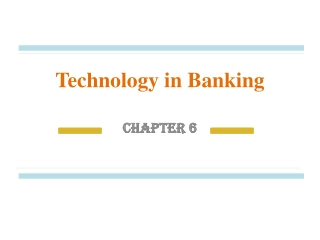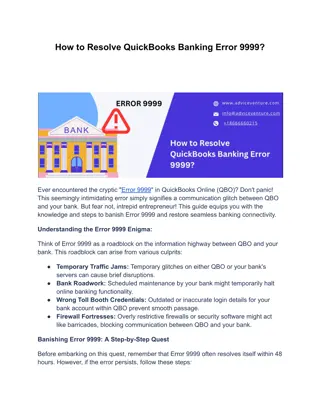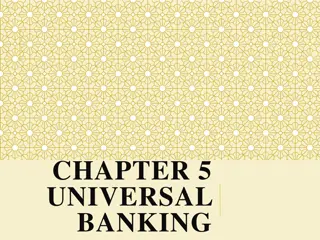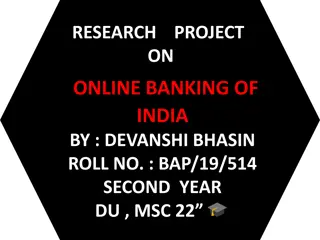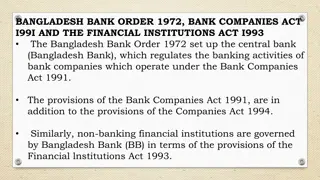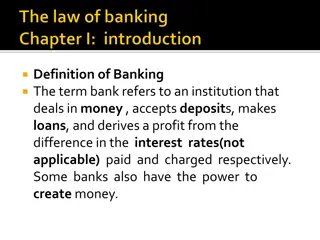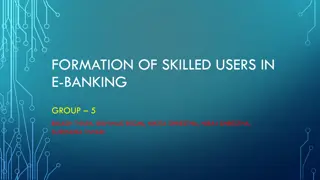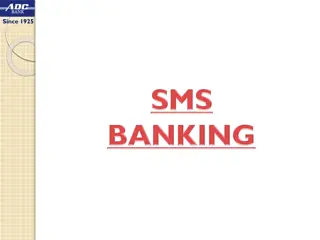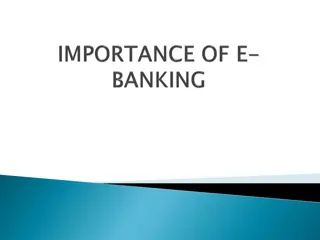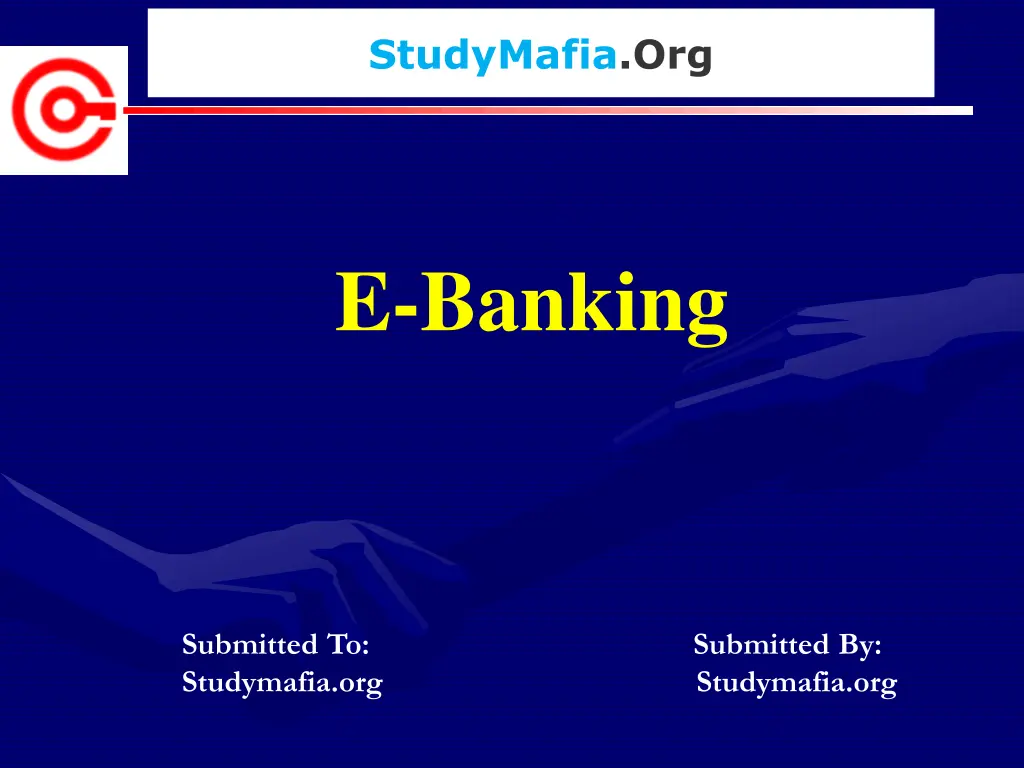
Understanding E-Banking: Services, Types, and Significance
Explore the world of electronic banking - from its definition to its various types and importance in today's digital age. Learn about the services offered, different types of e-banking, and why it is significant.
Download Presentation

Please find below an Image/Link to download the presentation.
The content on the website is provided AS IS for your information and personal use only. It may not be sold, licensed, or shared on other websites without obtaining consent from the author. If you encounter any issues during the download, it is possible that the publisher has removed the file from their server.
You are allowed to download the files provided on this website for personal or commercial use, subject to the condition that they are used lawfully. All files are the property of their respective owners.
The content on the website is provided AS IS for your information and personal use only. It may not be sold, licensed, or shared on other websites without obtaining consent from the author.
E N D
Presentation Transcript
StudyMafia.Org E-Banking Submitted To: Submitted By: Studymafia.org Studymafia.org
Table Contents Definition Introduction Types of E-Banking Types of Banking Sites Services Under E-Banking Significance of E-Banking Importance of E-Banking Conclusion 2
Definition Banks give administrations or bank services to draw in clients, from giving advances, issuing of debit cards and credit cards, computerised monetary services, and surprisingly personal services or administrations. 3
Introduction Electronic banking has many names like web-based banking, e-banking, virtual banking, or web banking, and online banking. It is just the utilisation of telecommunications networks and electronic networks for conveying different financial services and products. Through e-banking, a client can acquire his record and manage numerous exchanges utilising his cell phone or personal computer. 4
Types of E-Banking Type 1: This is the essential degree of administrations or services that banks offer through their sites. Through this assistance, the bank offers data, information regarding its services and products to clients. Further, a few banks might respond to an inquiry through email as well. 6
Types of E-Banking Type 2: In this category, banks permit their clients to submit directions or applications for various administrations, check their record balance, and so on. Be that as it may, banks don t allow their clients to do any fund-based exchanges with respect to their records or accounts. 7
Types of E-Banking Type 3: In the third category, banks permit their clients to work or operate their records or accounts for bill payments, purchase and redeem securities and fund transfers, and so on. Further, many new banks convey banking administrations principally through the other electronic conveyance channels or web. 8
Types of Banking Sites Transactional Websites: These sites permit clients to go through with exchanges on the bank s site. Further, these exchanges can go from a plain retail account balance request to huge business-to-business liquid assets transfers. The accompanying table records some normal wholesale and retail e-banking administrations presented by financial institutions and by banks. 9
Types of Banking Sites Wholesale services by banks: Include Account management, Cash management, Small business loan applications, Approvals or advances, Commercial wire transfer, Business-to- business payments, Employee benefit, and Pension administration. 10
Types of Banking Sites Retail services by banks: Include Account management, Bill payment, New account opening, Consumer wire transfers, Investment and brokerage services, Loan application and approval, and Account Aggregation. 11
Services Under E-Banking Mobile Banking: Mobile banking (otherwise called M-banking) is a name utilised for performing account exchanges or transactions, bill payments, credit applications, balance checks, and other financial exchanges through a mobile phone like a Personal Digital Assistant (PDA) or cell phone. 12
Services Under E-Banking Electronic Clearing System (ECS): The Electronic Clearing System is a creative provision for occupied individuals. With this provision, an individual s credit card bill is consequently charged from the same individual s savings bank account, so one doesn t have to stress over missed or late payments. 13
Services Under E-Banking Smart Cards: A smart card is a card that stores data on a microchip or memory chip or a microprocessor in lieu of the magnetic stripe found on debit cards and credit cards. Smart cards are not utilised for transferring or moving monetary data alone, but also they can be utilised for an assortment of identification grounds. 14
Services Under E-Banking Electronic Fund Transfers (ETFs): Electronic fund transfer (EFT) is the electronic exchange of cash starting with an individual account in the bank to another individual account of the same bank, or within or with other financial institutions or with multiple institutions, by means of personal computers based frameworks, without the immediate intercession of bank staff. 15
Services Under E-Banking Telephone Banking: Telephone banking is an assistance given by a bank or other monetary foundation or other financial institutions, that empower clients to perform via telephone a scope of monetary exchanges which don t include cash or financial instruments, without the need to visit an ATM or a bank branch. 16
Services Under E-Banking Internet banking: Web-based banking is an assistance presented by banks that permits account holders to get their record information by means of the web or the internet. Web-based banking or Internet banking is otherwise called Web banking or Online banking. 17
Services Under E-Banking Home banking: Home banking is the most common way of concluding the monetary exchange from one s own home as opposed to using a bank s branch. It incorporates making account requests, moving cash, covering bills, applying for credits, and directing deposits. 18
Significance of E-Banking Importance to clients: Lower cost per exchange:Since the client doesn t need to visit the branch for each exchange, it saves him both time and cash. No topographical hindrances: In conventional financial frameworks, geological distances could hamper specific financial exchanges. Convenience: A client can get to his record or bank account and execute from any place at any time. 19
Significance of E-Banking Importance to Businesses: Better efficiency: Electronic banking further develops usefulness. It permits the computerisation of ordinary, regularly scheduled payments and provides further banking activities to upgrade the efficiency of the business. 20
Significance of E-Banking Lower costs: Usually, costs in financial relationships and connections depend on the assets used. Assuming that a specific business needs more help with deposits, wire transfers, and so on, then, at that point, the bank charges its higher expenses. 21
Significance of E-Banking Lesser errors: Electronic financial diminishes mistakes in normal financial exchanges. Awful penmanship, mixed-up data or information, and so on can cause mistakes that can be exorbitant. Diminished misrepresentation: Electronic banking gives an advanced impression to all representatives who reserve the privilege to alter banking exercises 22
Significance of E-Banking Account reviews: Business proprietors and assigned staff individuals can get to the records rapidly utilising a web-based financial interface. This permits them to audit the record action and, furthermore, guarantee the smooth working of the account. 23
Importance of E-Banking Lesser exchange costs: Electronic exchanges are the least expensive methods of exchange. A decreased edge for human blunder: Since the data is handed-off electronically, there is no space for human mistakes or errors. Lesser desk work: Advanced records decrease desk work, paperwork, and make the cycle simpler to deal with. Likewise, it is ecological. 24
Importance of E-Banking Decreased fixed expenses: A lesser requirement for branches which converts into a lower fixed expense. More steadfast clients: Since e-banking administrations or services are convenient to the clients, banks experience higher reliability from their clients. 25
Conclusion E-banking offers a higher level of convenience for managing one's finances. However, it continues to present challenges to financial security and personal privacy. 27
Thanks To StudyMafia.org

